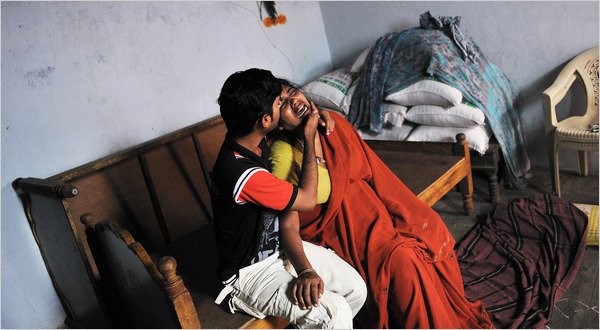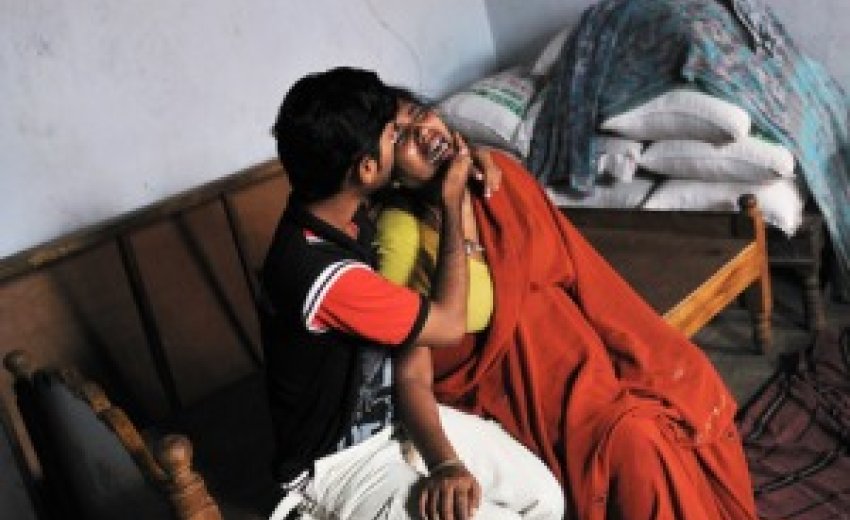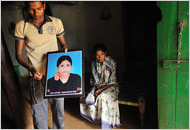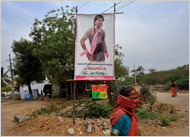
The mother and uncle of M. Sunil Kumar, who killed himself to aid a statehood struggle in India.
HYDERABAD, India — Sai Kumar Meegada, a 20-year-old straight - A chemical engineering student at a prestigious university here, came home from breakfast one morning early this month, slipped a length of clothesline around his neck, tied it to the ceiling fan in his dorm room and hanged himself.
|
|
“For the people of Telangana, this is my final salute,” said a note he left, referring to the decades-old struggle to create a separate region in Andhra Pradesh, a large state in southern India. “My final and last request is take my body to the legislative assembly. Goodbye.”
With that, Mr. Meegada became one of a surprising number of people — many of them young and educated, with bright futures awaiting them — to have committed suicide over the battle to carve out India’s 29th state. Some estimates have attributed more than 200 suicides to the cause.
But these politically motivated deaths are just one aspect of a troubling trend. Suicide has become something of a phenomenon in India, especially in the south, which now has one of the highest suicide rates in the world — a fact that has both puzzled and alarmed public health experts.
Suicides by indebted farmers are frequently reported in the news media and pointed to as a sign that India has forgotten its rural poor. But according to Indian government statistics, bankruptcy or poverty provoke less than 5 percent of Indian suicides. A family conflict, a broken love affair or an illness is a more likely spur.
Then there are politics. The number of ideologically motivated suicides in India doubled between 2006 and 2008, the last year for which statistics were available, according to the government. While the overall number remains small, mental health experts say these deaths illustrate the increasing stress on young people in a nation where, elections notwithstanding, the masses often feel powerless.
“Young people see this as a way to give meaning to what seem like meaningless lives,” said Sudhir Kakar, a prominent psychoanalyst and novelist who has written extensively about mental health in India. “It is a way to become a hero, to take a stand.”
Suicide is generally considered taboo in Hinduism, the religion of most Indians, because it disrupts the cycle of reincarnation that is central to the soul’s progress, Mr. Kakar said.
But the willingness to die for a cause, as exemplified by Gandhi’s epic fasts during the struggle for independence, is seen as noble and worthy. Ancient warriors in Tamil Nadu, in southeastern India, would commit suicide if their commander was killed, Mr. Kakar said. And the practice of sati, or widow burning, although outlawed, remains a potent symbol of wifely devotion.
In modern, democratic India, however, such drastic measures seem like a bizarre and troubling throwback that has shattered many families.
The political causes that spur multiple suicides can seem remarkably provincial. When Andhra Pradesh’s popular chief minister, Yeduguri Sandinti Rajasekhara Reddy, died in a helicopter crash last year, the news media reported suicides by dozens of his supporters, though such reports are difficult to verify.
Other suicide epidemics have had nothing to do with politics. When a gangster kidnapped the Indian actor Rajkumar, one of the biggest stars of Kannada-language films, in 2000, it was reported that dozens of his fans had committed suicide out of despair for their hero’s safety.
The fight for statehood for Telangana, an inland region that sees itself as marginalized by coastal elites, gained attention when a fast brought the movement’s leader, K. Chandrasekhara Rao, to the brink of death in December.
Since then, confusing political brawling has left the region’s statehood hopes in limbo, but dozens of young people besides Mr. Meegada, the engineering student, have succumbed to the emotional pull of the issue.
M. Sunil Kumar was a 25-year-old reporter at a local newspaper in the provincial town of Warangal. His older brother Anil had dropped out of high school to run the family’s mutton shop when their father died so that Sunil could go to college..
Mr. Kumar apparently became obsessed with the statehood movement, attending every meeting of the local activist group. One day in early March, the family went to a distant temple, but Mr. Kumar stayed behind. His mother discovered him hanging from a beam, one of her shawls around his neck.
“I am sacrificing my life for Telangana, to wake up our leaders,” he wrote in a suicide note.
But his family has also sacrificed, losing not only a son but also their biggest breadwinner. “I lost my son because of Telangana,” his mother, Swarupa, wailed. “Don’t burn your mother’s womb,” she shouted, imploring other statehood supporters not to commit suicide.
Nevertheless, local political leaders have exploited Mr. Kumar’s death. Outside the family’s two-room house hangs a banner with Mr. Kumar’s photograph superimposed over his suicide note. “Those who commit suicide for Telangana, we salute you,” the text on the poster says. “Wake up people and fight for Telangana.”
Political leaders of the movement said that they tried to discourage young people from committing suicide. “We tell them, don’t die for Telangana, live and fight for Telangana,” Mr. Rao said.
But other leaders seem less wary about celebrating suicide for the cause. “They are real heroes,” said Peddi Sudarshan Reddy, a member of the governing council of the main pro-statehood party. “But we are not glorifying that heroism.”
Glory is perhaps what Karunakar, 20, a lower-caste eighth-grade dropout, was looking for when he doused himself in kerosene and set himself alight in January.
He instantly became an icon in his village. A poster of him in a tough, Bollywood-style pose of defiance hangs in the village square, next to a small temple to the monkey god Hanuman. In life, he was unheralded: a day laborer who grew up in a part of town notorious for prostitution. In death, he was a hero.
“He was all the time talking of Telangana, Telangana, Telangana,” said his 70-year-old grandfather, Musku Hanumanthu. “I tried to persuade him not to get too involved. But he used to say, ‘I will sacrifice everything for Telangana.’ ”
He survived for three days in the hospital, expressing no regrets despite the pain of his burns, his grandfather said.
“Even in the hospital he kept saying, ‘Long live Telangana,’ ” Mr. Hanumanthu said.
Hari Kumar contributed reporting.



